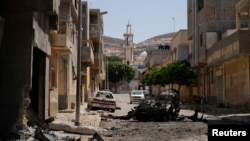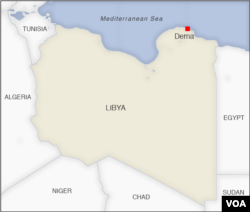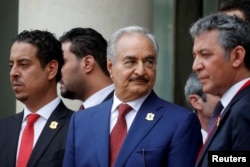Forces loyal to General Khalifa Haftar and his self-styled Libyan National Army (LNA) are poised to capture the last remaining city outside of their control in eastern Libya, after weeks of heavy fighting, bombardment and airstrikes, and after years of siege.
Haftar's army could wrench Derna from a coalition of local and Islamist fighters known as the Derna Protection Force, formerly known as the Derna Mujahedeen Shura Council.
"What remains outside the control of our forces is considered a small combat zone, less than just 10 kilometers squared," LNA spokesman Ahmed al-Mismari told Reuters earlier this week. "The operations are in their final stages and the fighting is very heavy."
Last month, Haftar's forces renewed their offensive "to liberate Derna from terrorists." Few experts, however, believe the city's capture will be the end for jihadists in Libya.
"The fight against extremism is only going to be symbolically won by any LNA [Libyan national Army] takeover of Derna, or any other city for that matter," said Darine El Hage, regional program officer at U.S. Institute of Peace's Center for Middle East and Africa.
"Indeed, evidence has shown that grievances stemming from heavy-handed military and security measures might make people more susceptible to joining extremist groups," she told VOA.
Daveed Gartenstein-Ross, a senior fellow at the Foundation for Defense of Democracies based in Washington, said "if the LNA captures Derna and expels jihadists from the city, they will not be finished in Libya."
"Jihadists already have a presence in the south of the country, among other areas," he added.
'Escalating humanitarian crisis'
This week, both the United Nations and the human rights group Amnesty International sounded the alarm over the escalating humanitarian crisis in Derna.
"From the people we have spoken to inside Derna, they have explained that the situation is quite dire," said Marwa Mohammed, Libya researcher with Amnesty International, in an interview with VOA.
"They've had very, very limited supplies that had gotten in, and that includes foodstuffs, medical supplies, fuel, cooking gas," she said.
Amnesty International had earlier in the week issued a statement on the fighting in Derna, in which the human rights watchdog said unnecessary hardships are being inflicted on ordinary men, women and children by the use of "blockade tactics."
According to Mohammed, people are afraid to flee Derna "because we do know there are people who are being arbitrarily detained, based on their profile" of being male and from Derna. After that, she said they disappear.
"What we are calling for is the protection of civilians, giving them free access to flee without been profiled," said Mohammed.
'Permissive environment'
With the Libyan National Army getting set to declare victory in Derna, many observers are pondering whether Haftar is considering something other than his stated goal of freeing Derna from the clutches of terrorists.
"It is difficult to identify one single reason behind the timing of the battle," said El Hage of USIP's Center for Middle East and Africa.
"The underlying root causes that allow for radicalization in or outside of Derna, are not won by military victories, at least not for the long term," she said.
Gartenstein-Ross of the Foundation for Defense of Democracies, says the best-case scenario, from a humanitarian and strategic point of view, is for the fighting in Derna to end quickly. If it gets drawn out, he said jihadists will be able to regroup and build their networks.
"Libya will remain a permissive environment until a political entity emerges with the will and capability to deny jihadists the ability to operate," he said.







